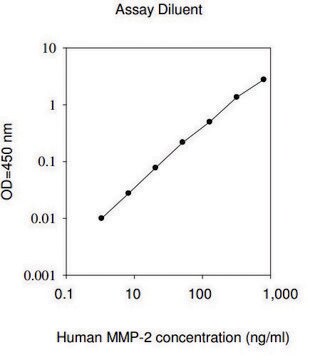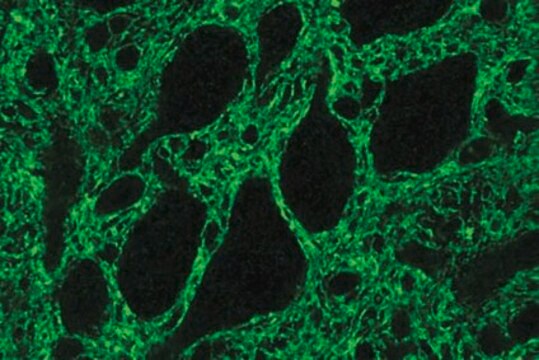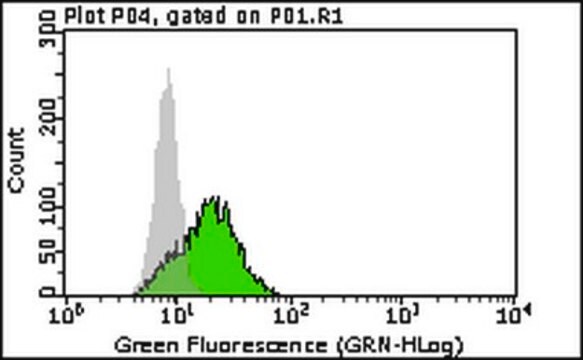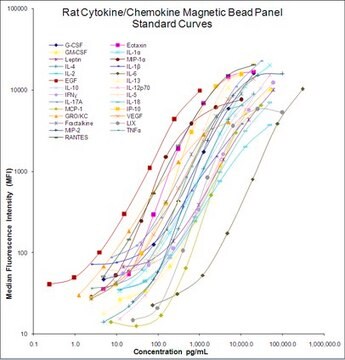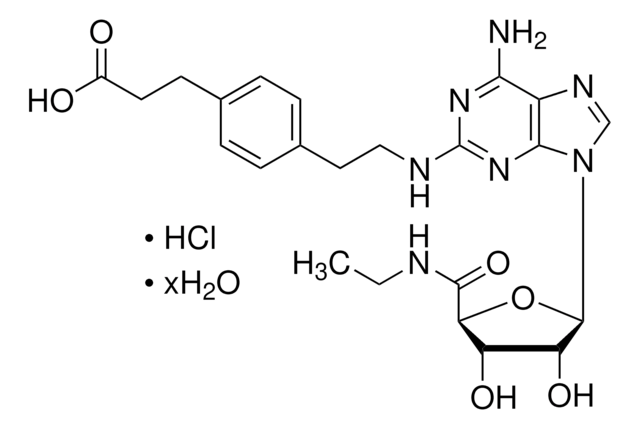推荐产品
生物源
human
品質等級
形狀
liquid
製造商/商標名
Chemicon®
濃度
0.2 μg/μL
NCBI登錄號
UniProt登錄號
運輸包裝
dry ice
基因資訊
human ... MMP14(4323)
一般說明
BACKGROUND: Matrix metalloproteinases (MMPs) are Zn2+- and Ca2+-dependent endopeptidases which function in the turnover of extracellular matrix components [Matrisian, 1992]. Presently, eighteen secreted MMPs and five membrane-type MMPs [Sato et al., 1994; Will & Hinzmann, 1995; Takino et al., 1995; Puente et al., 1996] are known to be expressed in vertebrates. Human MT1-MMP consists of 559 amino acid residues with a calculated Mr of 63516 [Sato et al., 1994; Will & Hinzmann, 1995]. The following domains and sequence regions are distinguished in MT1-MMP: Prodomain (Ser1-Arg88), catalytic domain (Tyr89-Gly261), junction between catalytic domain and hemopexin domain (Gly262-Gly292), hemopexin-like domain (Pro293-Cys485) and C-terminal sequence (Pro486-Val559) with transmembrane segment. A soluble form of MT1-MMP without transmembrane segment has been found in culture medium of a breast carcinoma cell line [Imai et al., 1996].
MT1-MMP is expressed in adult lung, placenta, kidney, ovaries, intestine, prostate and spleen [Will & Hinzmann, 1995]. Increased amounts of the enzyme are found in tumor tissues such as lung carcinoma [Butler et al., 1998], gastric carcinoma [Nomura et al., 1995], breast, head and neck carcinoma [Okada et al., 1995].
MT1-MMP is activated by removal of its prodomain. The reaction is catalyzed by furin, a subtilysin-type serine protease, which recognizes a motif of four basic amino acid residues located between the prodomain and catalytic domain [Pei & Weiss, 1996].
MT1-MMP activates progelatinase A [Sato et al., Strongin et al., 1995; Will et al., 1996] and procollagenase-3 [Knauper et al., 1996] by proteolytic cleavage of their domains. The ability of MT1-MMP to activate other matrix metalloproteinases provides potential for enhanced pericellular proteolysis in physiological and pathological processes. In particular, activation of progelatinase A by MT1-MMP is considered to contribute to local degradation of extracellular matrix during cell migration and proliferation. MT1-MMP also hydrolyzes fibrillar collagens I, II and III into characteristic ¾ and ¼ fragments [D′Ortho et al., 1997; Ohuci et al., 1997] and it cleaves a number of other ECM proteins, including fibronectin, vitronectin, laminin-1 and dermatan sulfate proteoglycan [D′Ortho et al., 1997; Pei & Weiss, 1996; Ohuci et al., 1997]. The activity of MT1-MMP is poorly inhibited by TIMP-1 but efficiently inhibited by TIMP-2 and TIMP-3 [Will et al., 1996].
MT1-MMP is expressed in adult lung, placenta, kidney, ovaries, intestine, prostate and spleen [Will & Hinzmann, 1995]. Increased amounts of the enzyme are found in tumor tissues such as lung carcinoma [Butler et al., 1998], gastric carcinoma [Nomura et al., 1995], breast, head and neck carcinoma [Okada et al., 1995].
MT1-MMP is activated by removal of its prodomain. The reaction is catalyzed by furin, a subtilysin-type serine protease, which recognizes a motif of four basic amino acid residues located between the prodomain and catalytic domain [Pei & Weiss, 1996].
MT1-MMP activates progelatinase A [Sato et al., Strongin et al., 1995; Will et al., 1996] and procollagenase-3 [Knauper et al., 1996] by proteolytic cleavage of their domains. The ability of MT1-MMP to activate other matrix metalloproteinases provides potential for enhanced pericellular proteolysis in physiological and pathological processes. In particular, activation of progelatinase A by MT1-MMP is considered to contribute to local degradation of extracellular matrix during cell migration and proliferation. MT1-MMP also hydrolyzes fibrillar collagens I, II and III into characteristic ¾ and ¼ fragments [D′Ortho et al., 1997; Ohuci et al., 1997] and it cleaves a number of other ECM proteins, including fibronectin, vitronectin, laminin-1 and dermatan sulfate proteoglycan [D′Ortho et al., 1997; Pei & Weiss, 1996; Ohuci et al., 1997]. The activity of MT1-MMP is poorly inhibited by TIMP-1 but efficiently inhibited by TIMP-2 and TIMP-3 [Will et al., 1996].
CC1043 is a recombinant polypeptide sequence produced as a periplasmic protein in E. coli. The proenzyme consists of MT1-MMP residues corresponding to Ser1-Val501 followed by tone Thr-residue and six His-residues. The calculated Mr of the recombinant soluble proenzyme is 58200 Da.
應用
Useful as an antigen standard in immunoassays. The proenzyme can be activated with trace amounts of MT1-MMP catalytic domain (D′Ortho et al., 1997; Butler et al., 1998).
外觀
Provided as a liquid in 50 mM Tris-HCl, pH 7.5, 150 mM NaCl, 5 mM CaCl2.
儲存和穩定性
Maintain frozen at -70°C in undiluted aliquots. The enzyme may be stored at -20°C for several weeks. Repeated freezing and thawing should be avoided
分析報告
Appears as a predominant band at 58 kDa in SDS-PAGE
法律資訊
CHEMICON is a registered trademark of Merck KGaA, Darmstadt, Germany
免責聲明
Unless otherwise stated in our catalog or other company documentation accompanying the product(s), our products are intended for research use only and are not to be used for any other purpose, which includes but is not limited to, unauthorized commercial uses, in vitro diagnostic uses, ex vivo or in vivo therapeutic uses or any type of consumption or application to humans or animals.
儲存類別代碼
12 - Non Combustible Liquids
水污染物質分類(WGK)
WGK 1
閃點(°F)
Not applicable
閃點(°C)
Not applicable
H Will et al.
The Journal of biological chemistry, 271(29), 17119-17123 (1996-07-19)
It has been proposed that the cell-mediated activation of progelatinase A requires binding of the C-terminal domain of the proenzyme to a membrane-associated complex of the membrane type matrix metalloproteinase MT1-MMP and TIMP-2. Subsequent sequential proteolysis of the propeptide by
H Sato et al.
Nature, 370(6484), 61-65 (1994-07-07)
Gelatinase A (type-IV collagenase; M(r) 72,000) is produced by tumour stroma cells and is believed to be crucial for their invasion and metastasis, acting by degrading extracellular matrix macro-molecules such as type IV collagen. An inactive precursor of gelatinase A
Membrane type 1 matrix metalloproteinase digests interstitial collagens and other extracellular matrix macromolecules.
Ohuchi, E, et al.
The Journal of Biological Chemistry, 272, 2446-2451 (1997)
Cardiac restricted overexpression of membrane type-1 matrix metalloproteinase causes adverse myocardial remodeling following myocardial infarction.
Spinale, FG; Mukherjee, R; Zavadzkas, JA; Koval, CN; Bouges, S; Stroud, RE; Dobrucki et al.
The Journal of Biological Chemistry null
Lisa M Hodgkinson et al.
Investigative ophthalmology & visual science, 48(9), 4192-4199 (2007-08-29)
Matrix metalloproteinases (MMPs) and the tissue inhibitors of the MMPs (TIMPs) have been implicated in lens differentiation, growth, remodeling, and cataract. Hence, a gene expression analysis was undertaken in epithelial and fiber cells dissected from clear human donor lenses. The
我们的科学家团队拥有各种研究领域经验,包括生命科学、材料科学、化学合成、色谱、分析及许多其他领域.
联系技术服务部门
